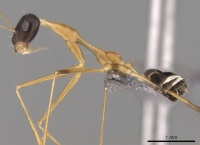Lepisiota elegantissima
| Lepisiota elegantissima | |
|---|---|

| |
| Scientific classification | |
| Kingdom: | Animalia |
| Phylum: | Arthropoda |
| Class: | Insecta |
| Order: | Hymenoptera |
| Family: | Formicidae |
| Subfamily: | Formicinae |
| Tribe: | Plagiolepidini |
| Genus: | Lepisiota |
| Species: | L. elegantissima |
| Binomial name | |
| Lepisiota elegantissima Collingwood & van Harten, 2011 | |
Workers of this unusual species have been collected from a water trap and in a malaise trap.
Identification
Collingwood et al. (2011) - An elegant elongate species with long legs and antennae, differing from Lepisiota arenaria and Lepisiota longinoda by its blunt petiole and long narrow mid-body.
Keys including this Species
Distribution
Latitudinal Distribution Pattern
Latitudinal Range: 25.3° to 25.3°.
| North Temperate |
North Subtropical |
Tropical | South Subtropical |
South Temperate |
- Source: AntMaps
Distribution based on Regional Taxon Lists
Afrotropical Region: United Arab Emirates (type locality).
Distribution based on AntMaps
Distribution based on AntWeb specimens
Check data from AntWeb
Countries Occupied
| Number of countries occupied by this species based on AntWiki Regional Taxon Lists. In general, fewer countries occupied indicates a narrower range, while more countries indicates a more widespread species. |

|
Estimated Abundance
| Relative abundance based on number of AntMaps records per species (this species within the purple bar). Fewer records (to the left) indicates a less abundant/encountered species while more records (to the right) indicates more abundant/encountered species. |

|
Biology
Castes
Known only from the worker caste.
Nomenclature
The following information is derived from Barry Bolton's Online Catalogue of the Ants of the World.
- elegantissima. Lepisiota elegantissima Collingwood & van Harten, in Collingwood, et al. 2011: 464, pl. 108-109 (w.) UNITED ARAB EMIRATES.
Unless otherwise noted the text for the remainder of this section is reported from the publication that includes the original description.
Description
Worker
Head and gaster black, midbody and petiole yellowish brown. Legs and antennae yellow, the apical parts of mid and hind femora are suffusedly blackish. Surface sculpture dull, finely reticulate. Petiole long with very short blunt lateral processes (teeth). Propodeum with a pair of fine upright teeth. Mesonotum tube-like, very thin, narrow and long relative to pronotum and propodeum.
Measurements (in mm): Total 4.25-4.60; head length 0.80-0.82; head width 0.46-0.61, scapus length 2.0, eye diameter 0.23, petiole width 0.16; petiole length 0.56; propodeal teeth 0.09; mesonotal width 0.16; mesonotal length 0.24; hind tibia 2.04; pronotum 0.90 long, 1.46 wide. Scape index 4.44 (excessively long in comparison to other species). No dorsal hairs except for a few on clypeus and some very short hairs on petiole.
Type Material
Holotype: worker. United Arab Emirates, Wadi Maidaq [25°18'N 56°07'E], 26.x-9.xi.2006, in yellow and white water traps, leg. A. van Harten (Leiden Nationaal Natuurhistorische Museum). Paratypes: 5 workers, same data as holotype but in World Museum, Liverpool; 1 worker, same data but 15-31.x.2010.
Etymology
The species epiphet elegantissima is derived from ‘elegans’, Latin for elegant, meaning most elegant, referring to the shape of this very beautiful species.
References
- Borowiec, L. 2014. Catalogue of ants of Europe, the Mediterranean Basin and adjacent regions (Hymenoptera: Formicidae). Genus (Wroclaw) 25(1-2): 1-340.
- Collingwood, C.A., Agosti, D., Sharaf, M.R. & van Harten, M. 2011. Order Hymenopters, family Formicidae. in: Arthropod Fauna of the UAE. Volume 4, pages 405-474.
- Collingwood, C.A., Agosti, D., Sharaf, M.R., van Harten, A. 2011. Order Hymenoptera, family Formicidae. Arthropod fauna of the UAE 4: 405-474.
References based on Global Ant Biodiversity Informatics
- Borowiec L. 2014. Catalogue of ants of Europe, the Mediterranean Basin and adjacent regions (Hymenoptera: Formicidae). Genus (Wroclaw) 25(1-2): 1-340.
- Monks J., S. Ross, M. Geiser, J. De Prins, M. Sharaf, N. Wyatt, S. Al Rijeibi, and A. Polaszek. 2019. A preliminary survey of the insect fauna of the Hajar Mountain Range, Oman. Journal of Natural History 53(15-16): 939-963.
- Sharaf M. R., J. Monks, A. Polaszek, and A. S. Aldawood. 2016. A remarkable new species of the genus Lepisiota Santschi (Hymenoptera: Formicidae) from Oman and the United Arab Emirates with a key to the Arabian species. Journal of Natural History http://dx.doi.org/10.1080/00222933.2016.1180722

